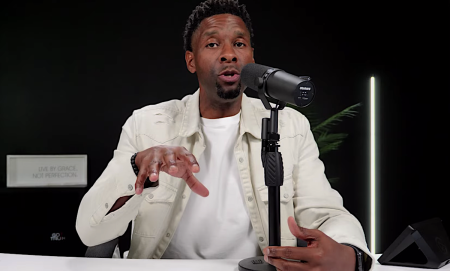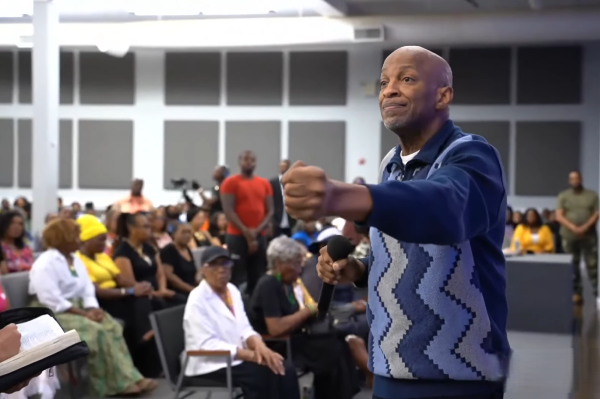Pastor shares 7 ways Christians can discern false teachers, heretical teachings

A preacher with nearly 1 million followers on YouTube listed seven ways Christians can discern whether a church leader is a “false teacher” and when unbiblical teachings are being preached.
Allen Parr, a bi-vocational Bible teacher with has over 936,000 subscribers on YouTube, shared how to expose false teachers by using the Bible as one's source on the "Challenging Conversations" podcast with apologist Jason Jimenez.
Parr said the first characteristic Christians should be aware of can be found in Jude 1:4, which says that false teachers have a way of secretly slipping in among Christians and disguising themselves alongside godly church leaders.
He also alluded to the notion that once false teachers have gained the trust of the masses, they will then use certain preaching tactics and approaches that blend false doctrine with biblical truths in a way that appears to be fully God-centered.
“False teachers typically mix truth with error. They mix truth with heresy. Because most people who are teaching false doctrine know that if they just came straight up and just said, ‘Hey, Jesus is not God,’ then they know they would lose their congregation, they would lose their money [and] they would lose their support,” Parr said.
“And so, very few, really none of them actually come out and say that. But they're always very secretive and crafty at mixing just enough truth to deceive a lot of people, and then putting in that false teaching as well.”
The second way to distinguish if a preacher is a false teacher is by the type of lifestyle they lead, according to Parr, adding that this can also apply to some pastors who have a larger public following than most.
“Obviously, no one's perfect, but if there's someone teaching the Word of God and they're living a lifestyle that is blatantly contrary, unrepentant, [with] no accountability whatsoever, then that would be somebody that you would want to start thinking about whether or not you want to follow this particular person if they are living in unrepentant sin,” Parr said.
The third way that false teachers can be recognized, Parr said, is if they don't have any godly authoritative figures speaking into their lives. “[Jude says false teachers] reject authority. So, if you're under a pastor and they have no authority over them, and they don't have anybody calling them out and they're not accountable to a group of people and elders, then that's somebody that's pretty dangerous. They're really doing their own thing.”
Parr said the fourth way false teachers can stand out is by denying that Jesus Christ is the sovereign Lord. The fifth way to pinpoint a "false teacher" is if they claim that their dreams or visions are on the same authoritative level as the Bible.
“The Word of God is the only authoritative Scripture that we have,” Parr noted.
Certain leaders in churches, Parr said, exhibit the sixth characteristic of false teachers on his list: They have established environments that are contrary to Scripture. And as a result, Parr said, pastors in these scenarios lead many people astray.
“A lot of the people who teach in these progressive churches would be considered false teachers because they are same-sex affirming. They are affirming people who want to get an abortion [or] who want to change genders and things like that,” Parr said.
“And what they're doing is they're perverting the grace of God. They're saying, ‘God will have grace upon you. God won't judge you. God won’t discipline you. You can be who you are and we can affirm you just the way you are.’”
The seventh and final attribute that false teachers tend to display, Parr said, is being in ministry solely to make money off their congregants.
“In verse 11, [Jude] talks about [false teachers] ‘taking the way of Cain and then rushing for profit into Balaam’s error.’ And I think that's a huge one. People who are trying to use the ministry simply as a profit,” he said.
“A lot of prosperity teachers are actively asking people to sow a seed into their ministry. And then, even worse than that, promising people that they'll get a blessing tenfold, a hundredfold and things like that, that is ridiculous. When you start running into those situations, it can be troublesome.”
Listen to "Challenging Conversations" and other shows on the Edifi Podcast Network
Throughout his more than three decades of serving in ministry, Parr said he's worked to “train people to be able to discern truth from error.”
In his own past experiences, Parr said he was deceived by a few false teachers and thus developed a yearning to keep others from falling into a similar trap.
“I was, unfortunately, led astray by a couple of people that I thought — when I was young in my faith — were genuine teachers of the Word of God. And they were teaching false doctrine. And because I was not spiritually mature enough to be able to really understand the difference between truth and error, I was being led astray,” Parr recalled.
While there are many people who deny that their pastor is a false teacher, Parr said there are also some people who label every pastor they disagree with as a false teacher.
“Everybody is calling everyone a false teacher these days. It's like, if you don't agree with something that someone says, ‘you're a false teacher.’ If I teach baptism by immersion, and somebody else teaches baptism by sprinkling, they're a false teacher,” Parr illustrated. as an example, without sharing his opinion on the matter. “So, it's important for people to know what is a false teacher, what is not, and more specifically, what is a false teaching and what is not.”
Christians must guard continually against false teachers, Parr cautioned, citing Matthew 7:15-20, which serves as another biblical warning about false prophets.
“I'm sure at some point in my life I have taught things that are false," Parr admitted, explaining that he is "fallible" and can get things "unknowingly" wrong sometimes.
“My bigger issue with some of the people … is not necessarily that maybe they may have misunderstood the Scriptures ... but to see them teach things that are contrary [to Scripture] leads me to believe that there's an ulterior motive behind why they're teaching something that is very different than what the revealed Word of God says.”
Nicole Alcindor is a reporter for The Christian Post. She can be reached at: nicole.alcindor@christianpost.com.





















